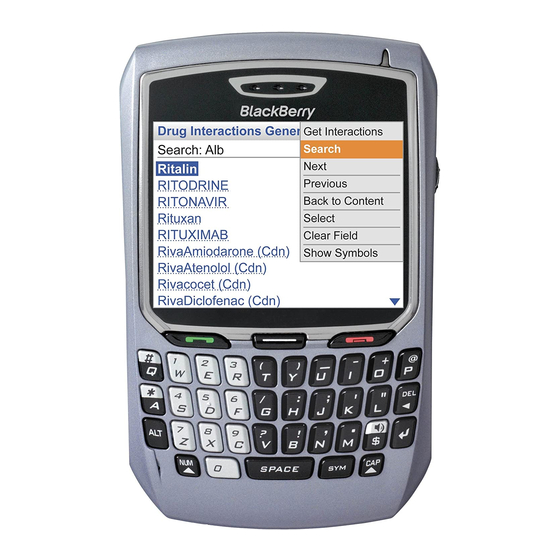Blackberry 8700C WIRELESS HANDHELD - GETTING STARTED GUIDE FROM CINGULAR Інформація про безпеку та продукцію - Сторінка 4
Переглянути онлайн або завантажити pdf Інформація про безпеку та продукцію для Мобільний телефон Blackberry 8700C WIRELESS HANDHELD - GETTING STARTED GUIDE FROM CINGULAR. Blackberry 8700C WIRELESS HANDHELD - GETTING STARTED GUIDE FROM CINGULAR 11 сторінок. Getting started guide
Також для Blackberry 8700C WIRELESS HANDHELD - GETTING STARTED GUIDE FROM CINGULAR: Посібник для початківців (37 сторінок), Інформаційний посібник користувача (18 сторінок), Посібник для початківців (28 сторінок)

Safety and Product Information
• Give your full attention to driving; driving safely is your first responsibility.
• Use hands-free operation if it is available.
• Pull off the road and park before making or answering a phone call.
RIM recommends that you do not use the BlackBerry device while driving. Instead, consider having a passenger in the
vehicle use the device for you, or find a safe location to stop your vehicle prior to using the device.
Store the device safely before driving your vehicle. Do not use any charging accessory as a means of storing the device
while you are in a vehicle. If your vehicle is equipped with an air bag, do not place the device or other objects above the
air bag, or in the air bag deployment area. If in-vehicle wireless equipment is improperly stored or installed, and the air
bag inflates, serious injury could result.
Radio frequency (RF) signals might affect improperly installed or inadequately shielded electronic systems in motor
vehicles. Check with the manufacturer or its representative regarding your vehicle. If any equipment has been added to
your vehicle, you should also consult the manufacturer of that equipment for information on RF signals.
Accessories
Use only those accessories approved by RIM. Using any accessories not approved by RIM for use with this particular
BlackBerry device model might invalidate any approval or warranty applicable to the device, might result in the non-
operation of the device, and might be dangerous.
Antenna care
Use only the supplied integral antenna. Unauthorized antenna modifications, or attachments could damage the
BlackBerry device and might violate U.S. Federal Communications Commission (FCC) regulations.
Operating and storage temperatures
Situate the BlackBerry device or device accessories away from heat sources, such as radiators, heat registers, stoves, or
other apparatus (including amplifiers) that produce heat.
If you are not going to use the device for more than two weeks, turn the device power off, remove the lithium-ion
battery, and follow the operating and storage temperatures listed below:
Device operating
Device storage
Interference with electronic equipment
Most modern electronic equipment is shielded from RF signals. However, certain electronic equipment might not be
shielded against the RF signals from the BlackBerry device.
Pacemakers: Consult a physician or the manufacturer of your pacemaker if you have any questions regarding the effect
of RF signals on your pacemaker. If you have a pacemaker, verify that you are using the device in accordance with the
safety requirements associated with your particular pacemaker, which might include the following:
• Always keep the device more than 7 inches (20 cm) from the pacemaker when the device is turned on.
• Do not carry the device in your breast pocket.
• When using the phone on the device, use the ear opposite the pacemaker for making and receiving calls to minimize
the potential interference.
• If you have any reason to suspect that interference is taking place, turn the BlackBerry device radio and the
Bluetooth radio off immediately.
Hearing aids: Some digital wireless devices may interfere with some hearing aids. In the event of such interference,
consult your service provider or contact the manufacturer of your hearing aid to discuss alternatives.
4
32 to 122°F (0 to 50°C)
50 to 86°F (10 to 30°C)
Travel charger operating
Travel charger storage
32 to 113°F (0 to 45°C)
-22 to 167°F (-30 to 75°C)
